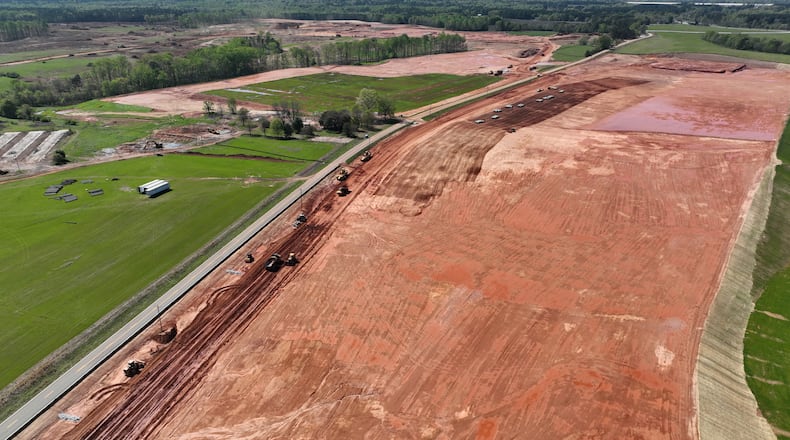Electric vehicle startup Rivian officially closed on a complicated land agreement Thursday to gain access to a 1,800-acre megasite an hour east of Atlanta, allowing the automaker to soon begin vertical construction on its planned $5 billion factory.
The Joint Development Authority of Jasper, Morgan, Newton and Walton counties (JDA) approved multiple resolutions earlier this week to finalize the lease agreement, issue bonds related to the project’s property tax financing and prepare to turn over the site to the California-based upstart. The authority owns the site within the Stanton Springs industrial park but will rent it to Rivian for 50 years for its 16 million-square-foot EV plant.
The closing is a milestone for Georgia’s second-largest economic development project, which is poised to cement the Peach State as a national leader for EV manufacturing and battery production.
“It’s a great day in Georgia as we close and issue the bonds for the Rivian project,” the JDA and Georgia Department of Economic Development said in a joint statement. “Rivian is the next step in delivering this generational opportunity, and Georgians in Jasper, Morgan, Newton, and Walton counties and beyond look forward to $5 billion in investment and 7,500 good-paying jobs that this innovative, American manufacturing company will bring.”
Credit: arvin.temkar@ajc.com
Credit: arvin.temkar@ajc.com
The land agreement was not universally celebrated or endorsed by all local leaders. Morgan County Commissioner Ben Riden cast a sole vote Monday against the closing over concerns about the battery production aspect of Rivian’s enterprise. Confusion over the the company’s plans to manufacture lithium-ion batteries on-site boiled over in local public meetings last month, according to reporting by the Morgan County Citizen.
Prolonged legal battles over zoning and incentives delayed Rivian’s construction plans and manufacturing timeline. Initially, the factory was slated to open in 2024, but that timeline was pushed back amid legal disputes over the $1.5 billion incentive package that Rivian was offered by state and local officials.
In Georgia, local development authorities offer tax breaks via so-called “bond-for-title” transactions. In Rivian’s case, the JDA will hold title to the factory property and Rivian will lease it back. As the JDA is a government entity that does not pay property taxes, the JDA would pass along some $700 million in property tax savings to Rivian through 2047. Bonds central to that agreement were issued Thursday once the closing was complete.
“Today’s action represents a significant milestone that has been achieved after years of thoughtful planning, hard work, and dedication by the JDA to bring life-changing opportunities to the people of this community,” the authority said in a statement. “The JDA is thrilled to see this historic opportunity now become a tangible reality that will provide numerous benefits to our citizens for decades to come.”
Credit: Rivian
Credit: Rivian
Because of the legal battles and delayed timeline, several agreements between the state, JDA and Rivian had to be amended and tweaked. In addition, the JDA slightly reduced the number of acres it will lease to Rivian to carve out a frontage road and a planned state training facility for future Rivian employees. The final lease is for about 1,744 acres, roughly a 200-acre reduction from earlier proposals.
Grading work on the site will continue through the end of the year, and Rivian is expected to soon begin vertical construction. A ceremonial groundbreaking ceremony will take place early next year, according to company spokespeople.
The forthcoming factory, which will eventually employ 7,500 workers at an average annual salary of $56,000, will produce the company’s R2 crossover when its assembly lines come online in 2026. Rivian executives said the new vehicle model, crucial to expanding the startup’s customer base, will be sold at a lower price than Rivian’s flagship R1T truck and R1S SUV.
Rivian reported increased revenue during this year’s third quarter and increased its annual production goal. However, the startup is still struggling to trim its losses and turn a profit, relying on billions of dollars in reserves it amassed from capital investors. Cox Enterprises, the owner of The Atlanta Journal-Constitution, also owns about a 4% stake in Rivian.
Rivian CEO R.J. Scaringe told shareholders Tuesday that he expects the Georgia facility to adopt strategies implemented at the company’s first manufacturing facility in Normal, Illinois, to more quickly ramp up production.
“Our team will apply this experience to our new manufacturing facility in Georgia with the goal of achieving a considerably lower cost structure,” he said.
About the Author
Keep Reading
The Latest
Featured




